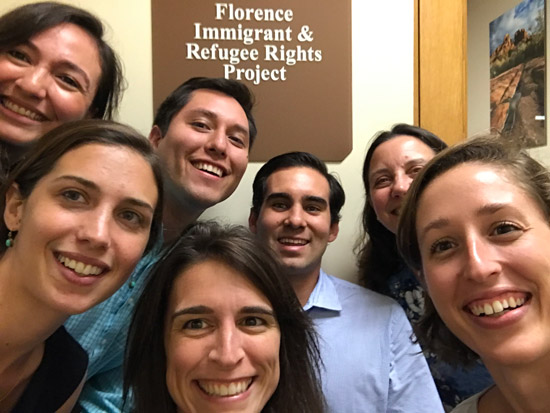BU Law and School of Social Work Team Aids Detainees in Arizona
Students and professors respond to the family separation crisis at the southern border.

In late August, members from Boston University School of Law and School of Social Work provided support to the Florence Immigration and Refugee Rights Project in Arizona. At the Florence Project, students and professors worked alongside the only legal services provider for separated families in the state.
Sarah Sherman-Stokes, associate director of the Immigrants’ Rights & Human Trafficking Program (IRHTP), recognized an opportunity to respond to the family separation crisis at country’s southern border. She reached out to an old friend from law school, currently at the Florence Project, and asked if they needed help.
“He graciously said yes,” she says “They are constantly up against huge demand and they have very limited resources. They work day and night but they can’t meet the demand of the children and adults who are facing deportation in Arizona.”
The Florence Project currently serves 5,000 detainees, a figure that includes 328 separated children.
Four BU Law students, Emily Kase (’19), Carlos Cousins (’19), Maggie Loeffelholz (’20), and Julio Olaya (’20) joined the team. They worked alongside Cheryl Azza of the School of Social Work and Madelyn Torres (SSW’19).
The team worked in jails and children’s centers, and focused on intake interviews and screenings.
“We were able to go out to these facilities and just spend several hours at a time meeting with as many people as needed to be seen,” Sherman-Stokes says.
These meetings added context and human connections to the stories of family separation the students had seen in the media and learned about in the classroom.
“Being there, I was able to add faces and actual people to some of the stories I was hearing, so it was very impactful and very intense,” says Maggie Loeffelholz.
Emily Kase expanded on the intensity of the trip, specifically at the detention centers holding children.

“Going to the children’s shelters was unlike anything I’ve ever seen. It was just, shocking and disturbing and overwhelming to see children in those conditions where they were detained and institutionalized in that way,” she says.
Julio Olaya wants to work in transactional law but hopes to include pro bono work in immigration law. He applied to participate in the IRHTP and attend the trip to pay forward the help his father, an immigrant from Mexico, received during his immigration process.
While on the trip, he noticed the dismal situation for those residing in the detention centers. Presentations were given to detainees to inform them of their legal rights and the background context about their detention. Attorney and volunteers worked with both adults and children.
“They really appreciated any information they could get. Many of them don’t speak English. They’re not quite sure what’s happening to them,” he says. “They just know that they were taken into custody, they were spoken to with some words that they didn’t understand, and now they’re in jail.”
Olaya describes the children’s presentations as “one of the more heartbreaking parts.”
“It’s in Spanish, sure, but you have no clue what their vocabulary is or how much they understand,” he says. “You don’t know how much they’re actually processing and you don’t know if they understand what you’re saying. I felt for them a lot.”
Sherman-Stokes brought up the lasting psychological effects of detention on both the adult and children population.
“Many of them have diagnoses such as PTSD, depression, anxiety, and other diagnoses related to the trauma they endured. Being able to work in partnership with social workers has really enriched the client experience and the student experience,” she says.

After returning to Boston, Congressman Joe Kennedy III asked to meet with the group to learn from their observations. The Massachusetts legislator has been very involved with the crisis.
At the meeting, Representative Kennedy asked each student about their individual experiences and what they observed from the trip.
Maggie reported, “It’s easy to manipulate these children who have experienced trauma and abuse; they’re already very vulnerable. The kids have already been denied a childhood, and now they’re expected to represent themselves in an immigration process that they don’t understand.”
Sherman-Stokes says they were fortunate to have had the meeting. In order to continue the work from Arizona, she recommended “meeting with our representatives and talking with them about the things that we saw, the injustices that we saw, and some policy fixes that we think would be prudent in the wake of those things.”
The Immigrants’ Rights & Human Trafficking Program will continue working with the Florence Project to create a legal manual for attorneys in Arizona who represent detained children. The clinic will also work with reunited families that were relocated in Boston, providing legal representation.
Kase says the trip reaffirmed her interest in immigration law.
“Working in immigration in any part of the country can be challenging and you definitely see that the system is not set up to protect people, and never really has been,” she says. “I think it already felt urgent and important, but even more so now.”
Reported by Josee Matela (CAS/COM’20)
Related News
- BU Works to Reunite Immigrant Families
- One case, one victory: BU Law Students Win Asylum for a Political Activist from Somalia
- Fighting Crime? There’s an App for That
- Two BU Law Clinics Partner with Graduate School of Social Work